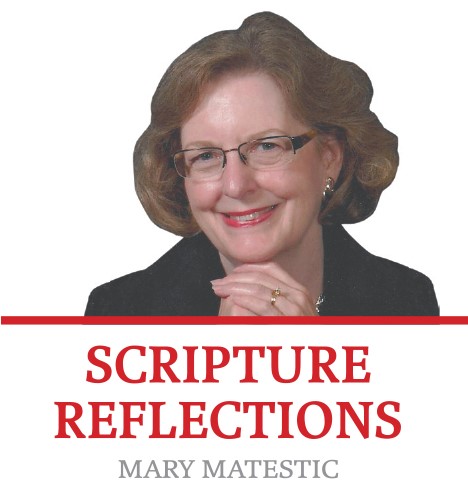Scripture Readings
Oct. 23, 2022
30th Sunday in Ordinary Time
Sirach 35:12-14, 16-18
2 Timothy 4: 6-8; 16-18
Luke 18:9-14
When does humility tip into the arena of pride? Are pride and humility just two sides of the same coin? Why is humility so important in the spiritual life? Why did Jesus tell a parable highlighting ego in one person and humility in another? And when does the ego die so that praying can be authentic?
Sometimes my husband comes back from a St. Vincent de Paul home visit with his eyes welled up with tears. “Mary,” he will say, “the back stairway to their apartment was falling apart. I don’t know how they will climb them in the winter. And the children had no beds, just a mattress on the floor. And no chairs to sit on. We stood for our visit. They needed vouchers for beds and dressers and warm clothes for the children.”
We sit at our kitchen table, and I listen while he processes the injustices played out daily upon the poor within our city.
I assure him that his presence and the care of St. Vincent de Paul will give the family hope. I admire his perseverance and his bull-headed tenacity to help our poor brothers and sisters find ways out of their tough spots, even if it is only temporarily.
On another subject, I watched a bit of Queen Elizabeth’s royal funeral rites. The part that held my attention most was the moment in which the orb, the scepter and her crown were taken from her coffin and handed to the Archbishop of Canterbury, who placed them upon the altar. The orb, symbol of the queen’s power as derived from God; the scepter, the symbol of the monarch’s governance; and the crown (studded with more than 2,868 diamonds), a symbol of her royal queenship, were all carefully placed upon the altar of surrender. Stripped of the symbols of royalty, her coffin was lowered into a crypt under the floor at Windsor Castle.
Watching that ritual, I thought of Jesus, who wore a crown of thorns and a scarlet military cloak. The reed placed into his bound hands created an incredibly humiliating spectacle for those watching. His throne was the cross from which he ruled with great love. His body was laid in a tomb without any of the appropriate burial rites. The King of Kings and the Lord of Lords.
What is required of the followers of Jesus when we pray? Several things: faith, humility and detachment from one’s possessions. The Gospel today focuses upon humility. The lesson is carefully unfolded in a parable. The audiences are those convinced of their own righteousness and their disdain for everyone else.
Two men are in the temple praying. The Pharisee stands alone at the front of the temple area, thanking God that he is not like all the rest of humankind, but especially not like the tax collector who is behind him. It is an ego-oozing moment wherein the Pharisee brags to God about his impeccable behavior and attentiveness to the law. The tax collector, humbly acknowledging his sinfulness, stands at a distance and cannot lift his eyes heavenward. He beats his breast begging God for mercy. Both are sinners. One cannot see his sin; the other has a heart of repentance and leaves justified.
Humility is owning the truth about oneself. Humility is truth.
Did you ever notice that those in the scriptures who truly encounter Christ seem to be able to see themselves more clearly?
Peter: “Leave me, Lord, I am a sinful man.” (Luke 5:8)
Mary: “Behold, I am the handmaid of the Lord.” (Luke 1:38)
Elizabeth: “And how does this happen to me, that the mother of my Lord should come to me.” (Luke 1:43)
Jeremiah: “Ah, Lord, I know not how to speak, I am too young.” (Jeremiah 1:5-6)
Isaiah: “Woe to me, I am a doomed man, for I am a man of unclean lips.” (Isaiah 6:5)
Job: “I had heard of you (God) by word of mouth, but now my eye has seen you. Therefore, I disown what I have said, and repent in dust and ashes.” (Job 42:5-6)
Roman Centurion: “Lord, I am not worthy that you should enter under my roof.” (Matthew 8:8)
Thomas: “My Lord, and my God.” (John 20:28)
It seems that the ego is stripped bare while facing Christ, who is pure love. Which leads me to realize that the tax collector in the parable had an authentic encounter with God. Like those mentioned above, he now knows himself truly in relationship to God, owns his sin and can ask for mercy.
I have always loved St. Augustine’s prayer, which starts: “Lord Jesus, let me know myself more so that I might know you more.” For Augustine and all those who have encountered the Lord in sincere prayer, there is a quieting of the ego, the first step in knowing God. Humbly, echoing Paul, we will gain the crown of righteousness, the crown of everlasting life.

